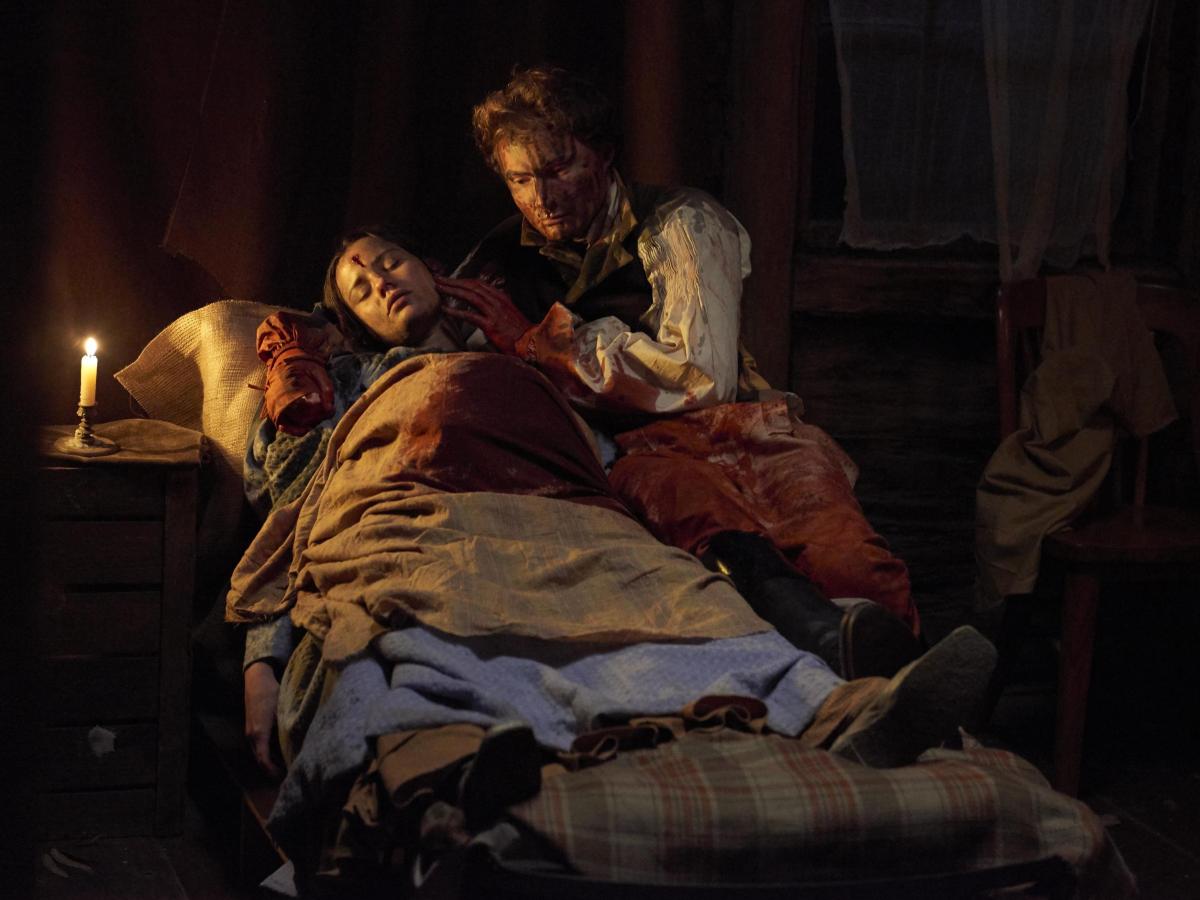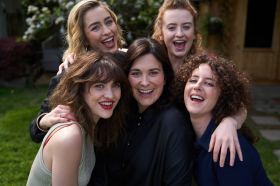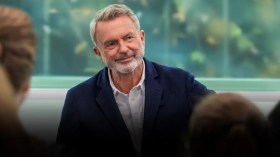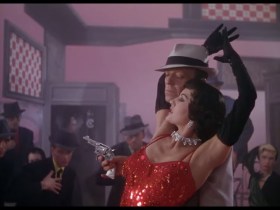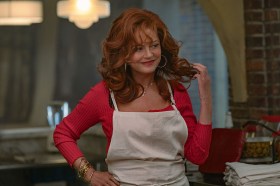Bloody white people in Björn Stewart’s Killer Native, courtesy of MIFF.
The urge to interrogate Australia’s colonial past through cinema isn’t new. Nor is the desire to unpack race relations both in the past and at present, or to examine the treatment endured by the nation’s Indigenous inhabitants along with it. All of the above have been simmering through the country’s filmic history for decades; however they’re now positively bubbling across the big screen. In a year that has already delivered two documentaries about the abhorrent, racially motivated booing of Adam Goodes at the tail end of his Australian Rules football career, plus Jennifer Kent’s searing Tasmanian-set, 1800s-era examination of violence against women and Aboriginal Australians in The Nightingale, Dark Place feels like an obvious, important and welcome companion piece. It isn’t the first Indigenous-helmed horror or ghost story anthology — that honour goes to Tracey Moffatt’s Bedevil, and was then followed by Warwick Thornton’s The Darkside — but it is a timely and powerful dive into the Indigenous experience through five suitably unsettling shorts.
Overseen by Majhid Heath (who also serves as a producer on four of the film’s quintet of unnerving stories), Dark Place ponders recognisable matters through a horror lens, from the stolen generation, to the exoticism of the other, to the invasive arrival of the first British settlers. ‘Anthology’ can often be synonymous for ‘mixed bag’, and that proves the case here, although it’s always a loaded term in this context. Unravelling different tales by a variety of filmmakers, diversity — of narratives, styles, themes and perspectives — is the entire point. Whether pondering the stereotyping of Aboriginal Australians in Liam Phillips’ Foe, or getting gothic in Perun Bonser’s The Shore, each vastly dissimilar short makes an impact. Some pair devilish humour with disarming insights, while others do more with mood and tone than story. Whichever applies, each benefits from a strong vision, evident talent behind the camera, and a unified mission to dissect the baggage, consequences and minutiae that have shaped the lives of Australia’s first people for more than two centuries.
Commencing with a statement piece, Kodie Bedford’s Scout has much on its mind, as laid bare in a scenario that’s both clever and immersive from the outset. Watching on as the titular character (Katherine Bennett) is snatched from her home draws instant historical parallels. So does the discovery that she’s one of many women who’ve been taken by white captors (including Nicholas Hope and Hugh Sheridan) for nefarious means. First quiet, then resourceful, Scout finds a way to fight back, with Bedford taking aim at institutionalised oppression in its many forms throughout her tight, tense short. Largely set in shipping containers, the film also marries its location, style and mood to a masterful degree, favouring a show rather than tell approach to its overarching feelings of constraint and control by force.
Next, Phillips’ Foe and Rob Braslin’s Vale Light share a focus on perception, though one probes the internalisation of community preconceptions, and the other plays with the fetishisation of difference. They work nicely as two sides of the same coin, as a woman (Leonie Whyman) searches for a solution to her violent sleep problems, and a young mother (Tasia Zalar) and her pre-teen daughter (Jolie Everett) make the acquaintance of a strange new neighbour (Sara Pensalfini) in a public housing estate. Crucial to each is the sense of amplifying common issues in domestic spaces, taking the prejudice thrust upon Indigenous Australians into the home and the heart. While the latter short comes with a subversive twist, they both boast a fine-tuned handling of suspense, trifling with familiar details but never failing to serve up the unexpected.
A sinister air also blows through Bonser’s The Shore and Björn Stewart’s Killer Native, which step into the supposed unpleasantness lurking in Australia’s wilderness. Filmed in black-and-white, The Shore perhaps dates better tonally and visually than narratively and thematically, yet in toying with the notion of savagery and its insulting connotations through the story of a daughter (Luka May Glynn-Cole) and her father (Bernard Curry), it still leaves an imprint. It’s in Killer Native, however, that Dark Place has the most fun. Stewart’s period-set short owes as much to comedy as splatter- and gore-filled horror, charting the farcical situation that arises when a Brit (Charlie Garber) and his pregnant wife (Lily Sullivan) land in Australia to start a new life, only to discover that terra nullius is a lie, that their predecessors have brought western illnesses with them, and that they’ll require the assistance of a local man (Clarence Ryan) to survive.
As well as ending the anthology on a high note, Killer Native provides Dark Place with both its most amusing and most insightful moment — and one that encapsulates the film’s attitude and status as a whole. Garber’s bumbling English import takes staking a claim literally, driving sticks into the ground and yelling my land!’ whenever he stumbles upon a patch he wants to keep. It’s a ridiculous and resonant sight all at once, and yet it also resembles what Dark Place’s five filmmakers find themselves doing in their own way. They’re not stealing terrain from its rightful owners, deeming it their own and erasing the past, of course. Rather, as they twist the supernatural, zombies, revenge and all-round spookiness into a pertinent societal commentary, the anthology’s directors successfully carve out their own niche in a dense space, and heartily shout their arrival to the masses.
That defiant spirit — and that ‘I’m here, this is mine and I’m telling all and sundry’ stance that goes with it — is one of the primary reasons that Dark Place shines. The film doesn’t present a new concept, as Moffatt’s and Thornton’s films illustrate; however this luminous collection of shorts pushes an Indigenous-helmed horror anthology back onto the screen with both passion and determination.
| 3.5 stars |
★★★☆
|
Dark Place
Directors: Björn Stewart, Perun Bonser, Kodie Bedford, Liam Phillips, Rob Braslin
Australia, 2019, 75 mins
Melbourne International Film Festival
August 1–18, 2019
Actors:
Director:
Format:
Country:
Release:
